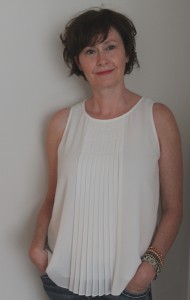Faces of Sustainability: Sherry Poirier
Posted on Monday, June 17th, 2013
 “As teachers at the College, we have to be role models and get people thinking, talking and taking ownership.”
“As teachers at the College, we have to be role models and get people thinking, talking and taking ownership.”
These words underpin Sherry Poirier’s approach to creating change for sustainability at Algonquin College. Sherry has been fostering more sustainable nursing practices over the course of her seven years as a professor in the Nursing program.
Years before her participation in the 2009 Small World Big Planet program, Sherry became aware of the practices of incinerating medical waste (consisting mostly of PVC plastics) and the resulting air pollution, which includes cancer-causing dioxin. “To me, the impacts of the physical environment on our health are abundantly clear.”
Her approach has been to work closely with students and to integrate community health issues in both theoretical and practical learning. She actively seeks out community placements that link social outcomes and the physical environment. As well, she works with students to conduct first-hand research on sustainability awareness in the nursing profession, plastic water bottle use on campus, and strategies to reduce waste within the teaching laboratory environment.
The student-led surveys have yielded information that is used to guide students’ proactive steps to minimize waste as they are learning. “Things are easy to ignore when you don’t know. It starts with awareness, and then responsibility comes with knowledge.”
Some of her students have developed profession-specific on-line learning modules to ensure that a common understanding of sustainability in the nursing context can be shared from year to year—for instance, in instilling practices for ‘greening the lab’ (https://www.algonquincollege.com/africa2009/sustainability.htm).
What’s Next?
Following a series of surveys and audits on waste and recycling, Sherry and her students spent much of the 2012-2013 academic year working on innovative strategies for material reuse and recycling of highly valuable (and perfectly clean) lab plastics and metal, in partnership with the ACCE building and the Early Childhood Education program. Moving forward, additional waste reduction will result from up-front lab kit purchasing, the impact and acceptance of this approach assessed through a year-long pilot.
“There is an opportunity to build in sustainability into best practices. These students are the ones to make the change as it becomes second nature, and they will take it forward.”
Related information:
Bachelor of Science of Nursing
Small World Big Planet
Sustainability in the Curriculum
- Posted in
- Faces of Sustainability